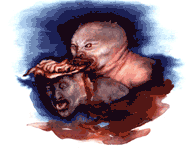
Ugolino: Circle 9, Inferno 32-3 There is perhaps no more grisly scene in all the Inferno than Dante's depiction of Ugolino eating the back of Ruggieri's head like a dog using its strong teeth to gnaw a bone (Inf. 32.124-32; 33.76-8). Ugolino's story, the longest single speech by one of the damned, is Dante's final dramatic representation in the Inferno of humankind's capacity for evil and cruelty. Aimed at explaining the scene of cannibalism in hell, Ugolino's story is all the more powerful because the speaker makes no attempt to exonerate himself of the crime--political treachery--for which he is condemned to eternal damnation. He instead wishes to defame his enemy and elicit compassion from his audience by recounting the brutal manner in which he and his innocent children were killed. Count Ugolino della Gherardesca earned his place in Antenora--the realm of political traitors--for a series of betrayals against Pisa and her political leadership. Dante mentions only the reputed act of treason that eventually led to Ugolino's downfall: in an effort to appease hostile and powerful guelph forces in Tuscany, Ugolino ceded Pisan castles to Florence and Lucca in 1285 (Inf. 33.85-6). However, early commentators and chroniclers describe other--even more damning--examples of shifting allegiances and betrayals in the long political life of Count Ugolino. Born into a prominent ghibelline family in Pisa, Ugolino switched to the guelph side following their ascendancy in Tuscan politics and tried to install a guelph government in Pisa in 1274-5. Unsuccessful in this attempt, he was imprisoned and later exiled. In 1284, several years after his return, Ugolino led Pisan forces in a naval battle against rival Genoa; despite his defeat, Ugolino was elected podestà (political head) of Pisa and his guelph grandson, Nino Visconti, soon joined him in power as "captain of the people." It was in this period that Ugolino, out of political expediency, ceded the Pisan castles to Lucca and Florence, a decision that caused a rift between him and his grandson and between their guelph followers. Taking advantage of resurgent ghibelline fortunes in Tuscany, Ugolino connived with the Pisan ghibellines, led by the Archbishop Ruggieri degli Ubaldini; Ugolino agreed to ghibelline demands that his grandson Nino be driven from the city, an order that was carried out--with Ugolino purposefully absent from the city--in 1288. The traitor, however, was then himself betrayed: upon Ugolino's return to Pisa, Ruggieri incited the public against him (by cleverly exploiting Ugolino's previous "betrayal of the castles") and had the count--along with two sons (Gaddo and Uguiccione) and two grandsons (Anselmo and Brigata)--arrested and imprisoned. They were held in the tower for eight months until, with a change in the ghibelline leadership of Pisa, it was decided to nail shut the door to the tower and to throw the key into the Arno. They starved to death, as Dante's Ugolino recalls, in a matter of days (Inf. 33.67-75). |